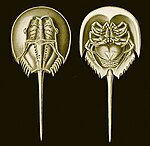The subphylum Chelicerata constitutes one of the major subdivisions of the phylum Arthropoda, and includes horseshoe crabs, scorpions, spiders and mites. They originated as marine animals, possibly in the Cambrian period, but the first confirmed chelicerate fossils, eurypterids, date from 445 million years ago in the Late Ordovician period. Few species now live in the sea (only the horseshoe crabs, and the sea-spiders if they are considered chelicerates), while more than 77,000 species live on land. The chelicerate bauplan consists of two tagmata – the cephalothorax and the abdomen – although the division between these sections is not apparent in Acari. The chelicerae, which give the group its name, are the only appendages that appear before the mouth. In most sub-groups they are modest pincers used in feeding, but spiders' chelicerae form fangs which are used to inject venom into their prey. (Full article...)
